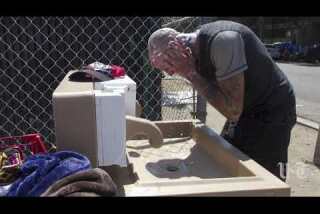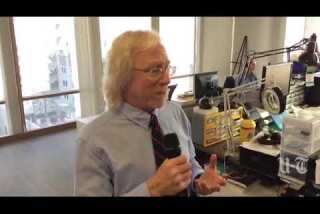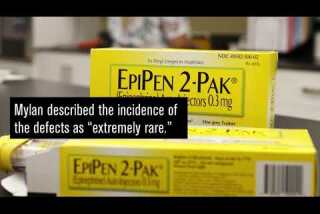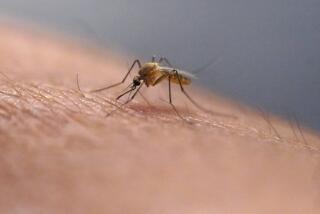Can a doorknob give you hepatitis A?

Leaders of the homeless community looking for answers and spreading information at the same time. (Fox 5 San Diego)
Waiting in line to catch the San Diego Trolley on C Street Friday afternoon, Wanda Hermes said she can’t help but think about the city’s ongoing hepatitis A outbreak in those moments when she’s touching the rails, seats and other surfaces that she encounters in the course of commuting to work in the morning and home at the end of the day.
Eyeing her big red ride as it pulled up to the downtown station, Hermes said the knowledge that there have been so many cases, more than 400 as of the last count, has made her more conscious of what she touches and which seat she chooses.
“It makes you think, maybe, you need to pay a little more attention more than you used to,” said Hermes, a city worker from La Mesa. “The people that are dirty, filthy, I don’t necessarily want to sit next to them.”
The fear in the air at the moment seems to be centered on the notion that shared surfaces and spaces might harbor malicious microbes, left by the touch of an infected person, that could transfer to the hands of the next individual to use that same handle or knob or buffet line utensil.
“I’m very worried about the people who are not getting vaccinated who are spitting and coughing and not covering their mouths, just a lot of things like that,” said Debbie Severson, a downtown resident waiting at the same trolley stop.
The question many may ask themselves is this: How much of this is simply paranoia? How likely is it that a person with hepatitis A might unintentionally leave behind a little something for the next somebody in line?
Lee-Ann Jaykus, a microbiologist at North Carolina State University who specializes in hepatitis and other types of food-borne illness, said that, while it is definitely possible for this bug to linger on a surface — maybe for weeks — it’s not likely.
She noted that only one activity is known to spread a hepatitis A infection: Accidentally ingesting a tiny amount of an infected person’s feces.
Even though this microbe is tough enough to live on surfaces for extended periods, it would take quite a large amount of material, she said, to actually have a transfer occur.
“It’s not impossible, but the chances are very slim. You would need people walking around with a lot of poop on their hands all of the time to be causing a problem in the general population,” Jaykus said.
Research shows that the chance of transference decreases with each thing that person touches after their hands are contaminated, she said. And dry surfaces tend to be less prone to collecting and holding substances than wet surfaces.
So, an infected food service worker who does not adequately wash his or her hands after going to the bathroom is more likely to transfer the illness to a moist, cold piece of lettuce while building your burger than a homeless person is to leave behind a significant contamination on the door handle of a downtown restaurant.
In all cases, Jaykus added, the bit of bad stuff would have to make it into your mouth. So, in the context of public transportation, just don’t lick anything at your local bus stop and wash your hands before putting them near your mouth. You should be just fine.
“In a city the size of San Diego, you should be more worried about a car accident than you should about this,” Jaykus said.
Rob Schupp, a spokesman for the San Diego Metropolitan Transit System said the cleaning solution for buses and trolleys has been changed to a 10 percent bleach solution. And some areas, such as wheelchair tie-downs, are being cleaned daily instead of weekly. It has long been the transit authority’s policy to clean its vehicles every day, and there are no plans to increase that frequency.
“Most vehicles are out in the field all day, which limits our ability to clean them to once per day. Bus operators and trolley personnel have been asked to be even more aware of potential clean-up issues. If one arises, we will dispatch cleaning personnel,” Schupp said.
Health Playlist


Video: Leaders urge public to help extinguish hepatitis outbreak

San Diego starts cleansing sidewalks, streets to combat hepatitis A

Video: Scripps to shutter its hospice service

Video: Scripps La Jolla hospitals nab top local spot in annual hospital rankings

Video: Does a parent's Alzheimer's doom their children?

EpiPen recall expands

Kids can add years to your life
(619) 293-1850
Twitter: @paulsisson
More to Read
Sign up for Essential California
The most important California stories and recommendations in your inbox every morning.
You may occasionally receive promotional content from the Los Angeles Times.











